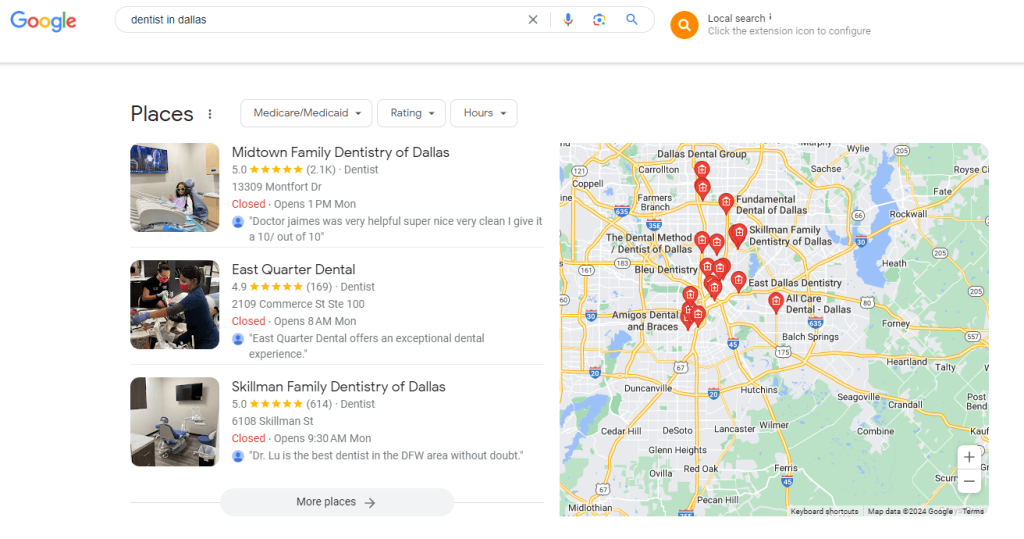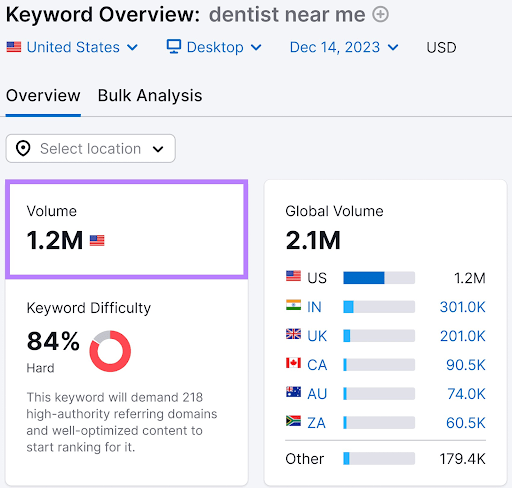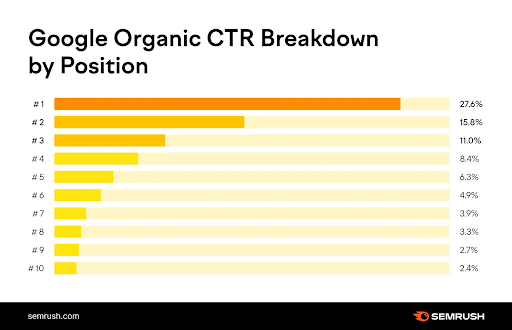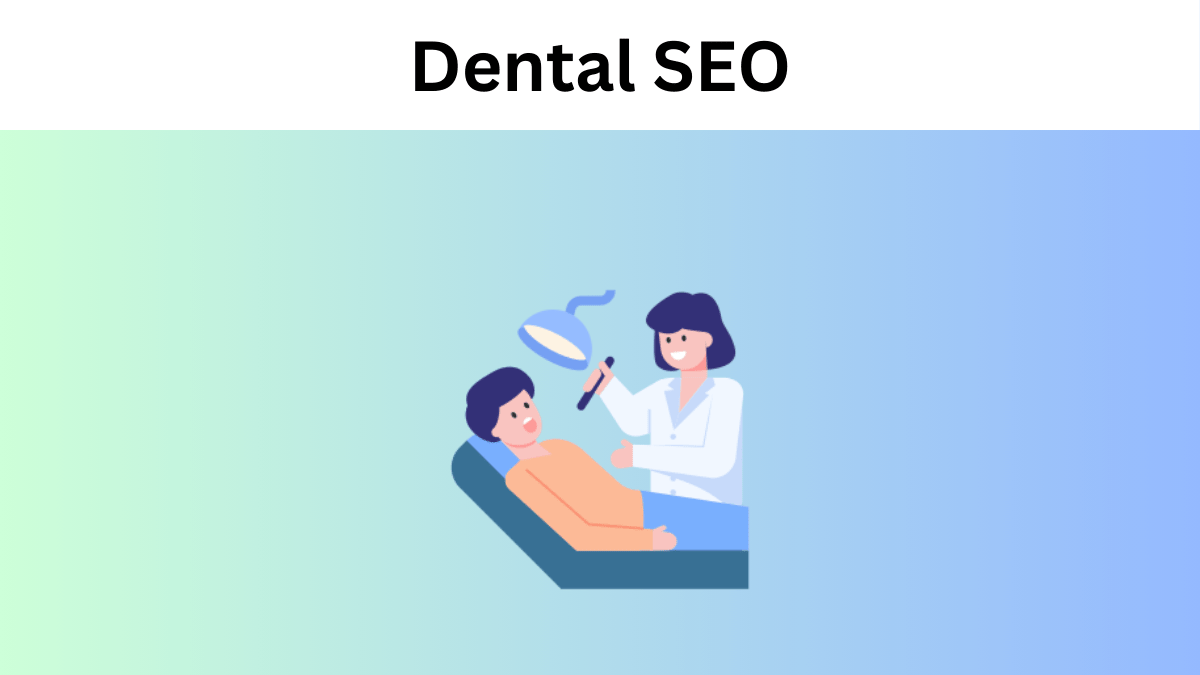Unlocking the Power of Dental SEO: A Comprehensive Guide to SEO for Dentists
In today’s digital landscape, search engine optimization (SEO) has become a critical component of any successful marketing strategy, and the dental industry is no exception. With millions of people turning to search engines to find local dental services, having a strong online presence can be the difference between a thriving practice and one that struggles to attract new patients.
What Is Dental SEO?
Dental SEO is the practice of optimizing a dental website and its associated online properties to rank higher in search engine results pages (SERPs) for relevant keywords and phrases. By implementing effective dental SEO strategies, practices can improve their visibility, attract more qualified leads, and ultimately drive more patients through their doors.
For example, dental SEO can help you earn Google rankings like this:

This visibility can prompt individuals to explore your website or reach out to your clinic. Dental practice SEO can be advantageous for general dentists, orthodontists, pediatric dentists, periodontists, prosthodontists, oral surgeons, and endodontists, irrespective of their scale or location.
Why Is SEO Important for Dentists?
Dentists find SEO crucial as numerous patients rely on search engines to seek dental services and information. For instance, in the U.S., there are more than 1.2 million monthly Google searches for “dentist near me,” as per Semrush’s Keyword Overview tool.

If your dental practice isn’t visible in searches for relevant keywords, chances are you’ll lose potential business to your competitors. It’s essential to secure a prominent ranking as well. Statistics show that, on average, 27.6% of searchers click on the top organic (unpaid) result, whereas only 2.4% click on the organic result in the 10th position.

SEO (Search Engine Optimization) is vital for dentists for several reasons:
- Increased Visibility: Effective SEO strategies ensure that a dentist’s website ranks higher in search engine results pages (SERPs). This increased visibility makes it easier for potential patients to find the dentist’s services when searching for related keywords.
- More Website Traffic: Higher rankings in SERPs lead to increased organic traffic to the dentist’s website. This means more people visit the website, learn about the services offered, and potentially become patients.
- Targeted Audience Reach: SEO allows dentists to target specific keywords related to their services, ensuring that their website is visible to users actively searching for dental services in their area. This targeted approach improves the chances of attracting relevant leads.
- Credibility and Trust: Websites that appear at the top of search results are often perceived as more credible and trustworthy by users. By optimizing their website for search engines, dentists can enhance their online reputation and build trust with potential patients.
- Cost-Effectiveness: Compared to traditional advertising methods, SEO offers a cost-effective way for dentists to promote their services. Once the website is optimized and ranks well in search results, ongoing maintenance costs are relatively low compared to other marketing channels.
- Competitive Advantage: In today’s digital age, most dental practices have an online presence. By investing in SEO, dentists can stay competitive and ensure that their practice stands out among competitors in their local area.
Overall, SEO plays a crucial role in helping dentists attract new patients, build credibility, and grow their practice in an increasingly competitive online landscape.
How to Do Dental SEO Marketing?
Whether you’re doing SEO for a dentist or another business, the same SEO basics apply.
However, dental practices should prioritize some techniques, particularly when it comes to local SEO (i.e., reaching searchers in their area). This free SEO checklist template on Attrock shows how you can tailor your SEO techniques to your business.
Here are 12 tips for success:
Keyword Research
Keyword research lays the foundation for an effective dental SEO strategy. This involves:
- Identifying relevant keywords and phrases potential patients use to search for dental services in your local area
- Using tools like Google’s Keyword Planner, SEMrush, and Ahrefs to find keywords with good search volume and reasonable competition
- Analyzing the keywords your top competing dental practices are targeting
- Creating a list of target keywords including head terms (e.g. “dentist”) and long-tail phrases (e.g. “affordable dental implants in Chicago”)
On-Page Optimization
Once you have your target keyword list, optimize all the pages on your dental website accordingly:
- Use target keywords in titles, meta descriptions, header tags, image alt text, and body content naturally
- Structure content with header tags, bulleted lists, etc. for better readability
- Ensure fast page load times and mobile-friendly design
- Have an organized, user-friendly website architecture
- Use descriptive URLs with target keywords instead of long strings of numbers/characters
Local SEO
Local SEO With most patients searching for “dentists near me”, local SEO is critical for dental practices:
- Claim and fully optimize your Google Business Profile listing with your NAP (name, address, phone), services, images, operating hours, etc.
- Build citations by getting your dental practice listed on reputable local directories like Yelp, Healthgrades, industry associations, etc.
- Encourage patients to leave reviews as these impact local pack rankings
- Use location-based keywords (e.g. “dentist in Manhattan”) and optimize for local searches
- Ensure your website shows your physical address and has localized content
List Your Practice in Reputable Online Directories
Getting your dental practice listed and cited on authoritative online directories serves several purposes:
- Builds Citations A citation is any mention of your practice’s name, address, and phone number (NAP) on the web. Having consistent NAP citations across reputable directories helps search engines verify your business information and location, which can improve your local rankings.
- Improves Online Visibility Listing your practice on popular dental directories expands your online presence and makes it easier for potential patients to find you when searching for dental services in your area.
- Generates Leads and Referral Traffic Many patients use online directories like Yelp, Healthgrades, ZocDoc etc. to research and compare dentists. Having an optimized listing can drive direct leads and referral traffic to your website.
Some of the top online directories to list your dental practice on include:
- Google Business Profile (formerly Google My Business)
- Yelp
- Healthgrades
- ZocDoc
- YellowPages
- Superpages
- Vitals
- RateMDs
- WebMD
- Local/City Directories
- Professional Dental Associations (ADA, AAO etc.)
When listing on these directories, be sure to:
- Claim/create your listing and verify you are the legitimate business owner
- Use a consistent name, address and phone number matching your website
- Add complete information – services, hours, payment methods, credentials etc.
- Incorporate keywords in your business descriptions
- Upload high-quality photos of your practice, team, office etc.
- Encourage patients to leave reviews on your listings
- Respond promptly to any questions or comments
Encourage Patients to Leave Reviews
The Importance of Reviews Positive reviews from satisfied patients serve as a strong trust signal for search engines and potential new patients researching your dental practice online. They help:
- Improve your visibility in local search results and Google’s local pack
- Build social proof and credibility for your business
- Provide valuable feedback to improve your services
- Stand out from competitors with fewer/negative reviews
How to Get More Reviews Implement a systematic process to regularly obtain new reviews from patients:
- In-Office Requests: Train staff to politely ask patients to leave a review at check-out
- Email Requests: Send personalized review request emails after appointments
- Text Requests: Leverage SMS/text messages with a direct link to review sites
- Offer Incentives: Provide minor discounts/rewards for submitting a review
- Make it Easy: Provide instructions, links, and QR codes to popular review platforms
- Reputation Management Software: Use tools to automate review requests
Where to Get Reviews Focus your efforts on the most prominent platforms like:
- Google – Prioritize Google reviews as they impact local pack visibility
- Healthcare Sites – Healthgrades, Vitals, WebMD, RateMDs etc.
- Social Media – Facebook, and Yelp are heavily used to research local businesses
- Your Website – Embed reviews prominently on relevant pages
Responding to Reviews Don’t just collect reviews, make sure to:
- Monitor all your review profiles frequently
- Respond promptly to all reviews, positive and negative
- Thank patients for positive feedback and address any concerns
- Use negative reviews as opportunities to improve
Demonstrate Experience, Expertise, Authoritativeness, and Trustworthiness
Google’s search quality evaluators put a strong emphasis on the E-E-A-T criteria when assessing websites, especially for health/medical-related topics like dentistry which can impact a person’s well-being and happiness.
Demonstrate Experience Show that your dental practitioners have the appropriate experience to provide the services and information on your website. Include detailed bios/credentials of your dentists highlighting their:
- Education/Degrees
- Years of experience
- Specialties/Certifications
- Memberships in professional associations
- Awards/Recognition received
Exhibit Expertise Position your dental practice as an authority and expert resource in your field. Ways to showcase expertise include:
- Publish high-quality, in-depth content about dental procedures, conditions, etc.
- Share unique insights, research or data about oral health topics
- Offer free guides, checklists, ebooks packed with your expert knowledge
- Host webinars, videos or podcasts featuring your dentists’ expertise
- Having your content reviewed/created by subject matter experts
Build Authoritativeness Establish your dental website as an authoritative source that users can trust. This can be achieved by:
- Getting quality backlinks from other respected medical/dental sites
- Having your practice/dentists mentioned or featured by authoritative publications
- Showcasing positive reviews/testimonials from respected professionals
- Listing relevant certifications, awards, and accolades
- Being actively involved in the dental community (associations, events etc.)
Increase Trustworthiness Build trust signals that create confidence amongst potential patients considering your services:
- Display your practice’s contact info, address, operational hours prominently
- Have an accessible, user-friendly website with clear navigation
- Use HTTPS to secure connections and data transmissions
- Showcase glowing patient reviews and testimonials
- Maintain active social media presences
- Be transparent about your dental team, pricing, processes etc.
- Follow best website practices regarding privacy policies, terms of service etc.
Content Marketing
Content Marketing High-quality, SEO-friendly content helps build authority and attract potential patients:
- Create blog posts, guides, FAQs around topics prospective dental patients search for
- Optimize content for target keywords but make it engaging, informative and valuable
- Use mixed media like videos, infographics along with text content
- Update your content consistently and share it on social media
- Guest post on other dental/medical sites to build links and exposure
Technical SEO
Technical SEO Several technical factors can impact search engine crawlability and rankings:
- Ensure your website is mobile-friendly and has fast load times
- Fix any broken links, duplicate content, redirect issues through an SEO audit
- Use structured data/schema markup to enhance search listings
- Enable AMP for mobile pages to load faster on mobile devices
- Have an SEO-friendly site architecture with proper use of sitemaps, robots.txt file
Link Building
Link Building Earn high-quality backlinks to improve your website’s authority and credibility:
- List your practice on credible local and medical directories
- Reach out to local partners/businesses for cross-promotion opportunities
- Publish data-driven studies, guides that other sites will want to link to
- Guest post on authoritative dental/medical blogs and websites
- Participate in local events, sponsorships, PR to earn mentions/links
Social Media Marketing
Social Media Marketing While not a direct ranking factor, social media can support dental SEO efforts:
- Create social profiles on channels suitable for your target audience
- Share your blog posts and other valuable content through social media
- Promote special offers, events, and accumulate reviews on social platforms
- Engage with your local community and interact with potential patients
- Use social media as a customer service channel to enhance patient experience
Analytics and Tracking
Analytics and Tracking Continuously measure and optimize your SEO performance:
- Set up Google Analytics and Google Search Console for your website
- Track key metrics like rankings, organic traffic, leads, conversions
- Identify areas of strength and opportunities for improvement
- Adjust your dental SEO strategy based on the insights you gain
- Stay updated on search engine algorithm changes that can impact rankings
Measuring the Success of Your Dental SEO Efforts
To gauge the effectiveness of your dental SEO strategies, it’s essential to track and measure the following key performance indicators (KPIs):
- Organic Search Traffic Monitor the number of visitors coming to your website from organic search results. Increased organic traffic can be an indication of improved search engine rankings and visibility.
- Keyword Rankings Track your website’s ranking positions for your target keywords and phrases. Consistent improvements in rankings can signal the success of your dental SEO efforts.
- Conversion Rates Measure the number of website visitors who convert into leads or new patients. A well-optimized website and online presence should result in higher conversion rates.
- Online Reviews and Ratings Monitor the number and quality of online reviews and ratings for your practice. Positive reviews can enhance your credibility and visibility in local search results.
- Referral Traffic Track the amount of traffic coming from backlinks and other referral sources. High-quality backlinks can improve your search engine rankings and drive more qualified leads to your website.
By regularly monitoring these KPIs and making data-driven decisions, you can refine your dental SEO strategy and maximize its impact on your practice’s online visibility, lead generation, and patient acquisition efforts.
Conclusion
In the competitive world of dental practices, a strong online presence and effective SEO strategy are essential for attracting and retaining patients. By implementing the dental SEO best practices outlined in this guide, you can improve your search engine rankings, increase your online visibility, and ultimately drive more qualified leads and new patients to your practice.
Remember, dental SEO is an ongoing process that requires consistent effort, monitoring, and adaptation. By staying up-to-date with the latest search engine algorithms and industry trends, and continuously refining your strategies, you can establish your practice as a trusted and authoritative source in your local community, outperform your competitors, and achieve long-term success in the digital landscape.
FAQs:
How can I promote my dental business?
Implementing a referral program offers a valuable strategy for boosting your dental practice’s visibility and attracting more patients. Establish a referral initiative that rewards patients for referring their family and friends. Consistently encourage patients to provide referrals after each visit, highlighting the benefits they’ll receive in exchange.
How does dental marketing work?
The primary objective of dental marketing or advertising is to encourage patients and potential clients to schedule an appointment, typically by contacting the office via phone. Click-to-call advertisements are accessible on Facebook and Google Ads (formerly Google AdWords) across mobile, desktop, and tablet platforms.
Is SEO necessary for dentists?
In today’s digital era, dental SEO plays a pivotal role in the expansion of your business. It guarantees that your dental services are readily discoverable by potential local patients who are searching online.
Check out relevant guides for other local businesses, too:
